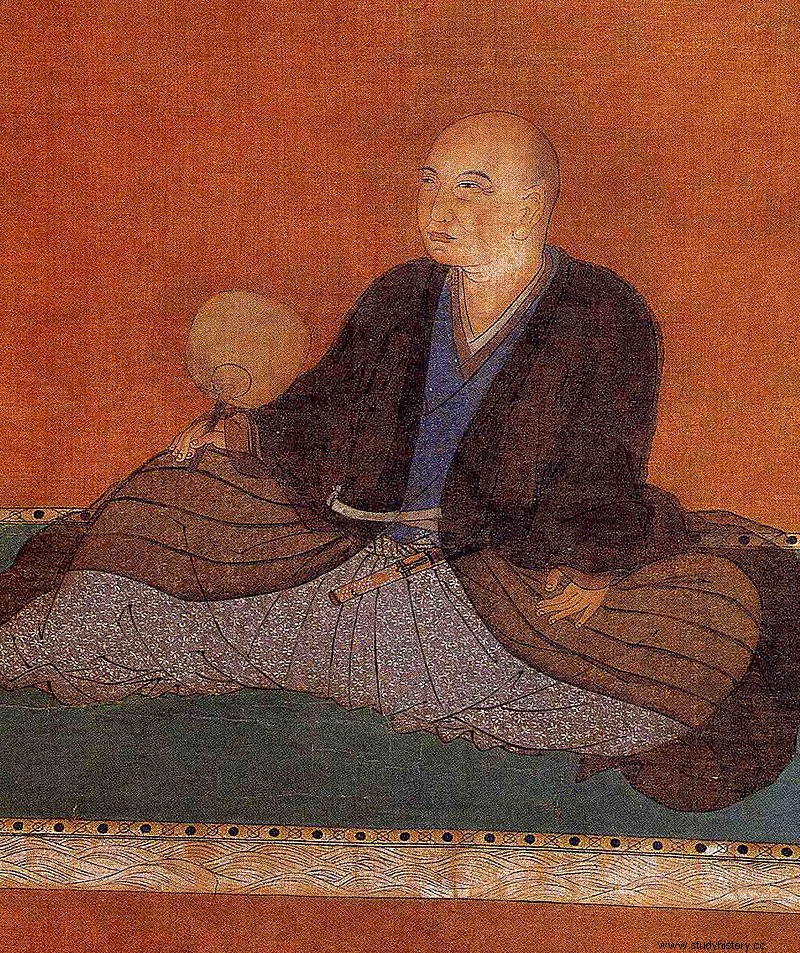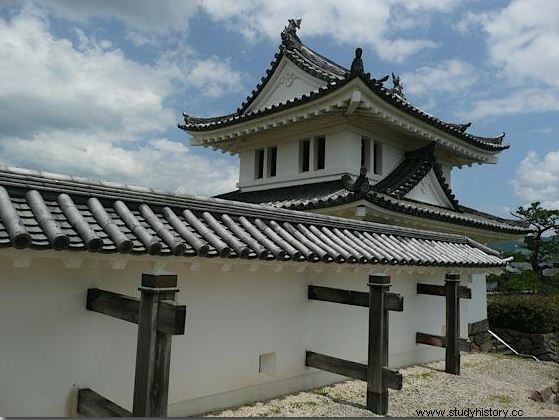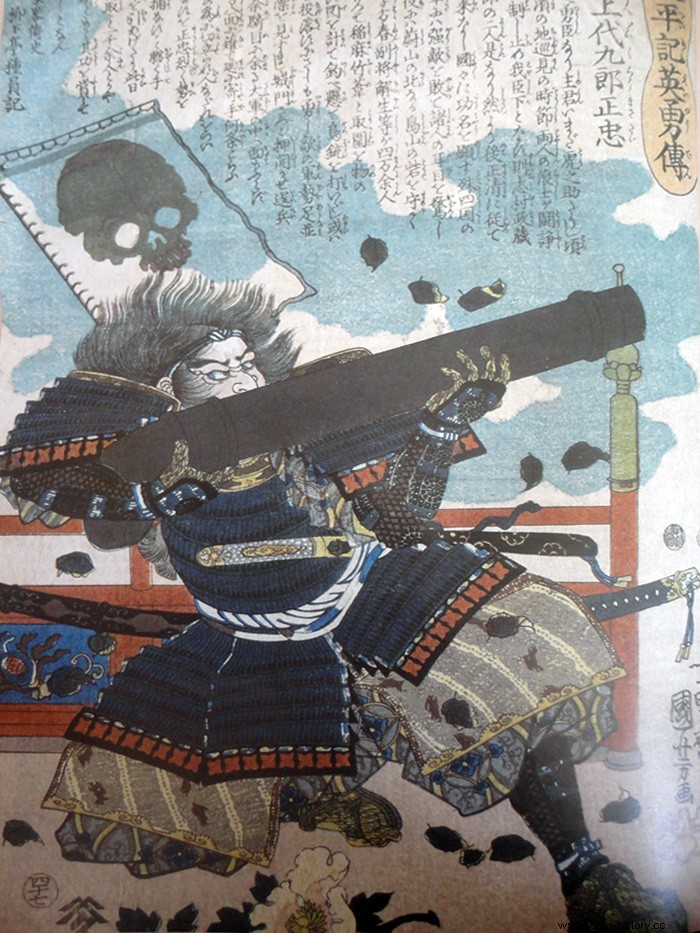Sometimes we tend to idealize everything that comes from the East. Without going any further, in Western eyes the figure of the samurai is usually surrounded by a halo of mysticism that has little to do with reality. We think they were honorable, spiritual warriors with high moral principles, but when it came down to it, they weren't that different from European medieval knights either. Another myth is to paint them as educated, refined and lovers of fine arts. As if every samurai, when not on the battlefield, spent his free time growing bonsai and composing verse. It is true that the cultural level of the Japanese at the time, especially among the nobility, was rather high. But from there to thinking that they were all learned and educated gentlemen goes quite a long way. In fact, as is often the case with gun people in all cultures, they were generally pretty rough guys.
But there were honorable exceptions. Samurai who, in addition to being warriors, were authentic humanists. Sensitive and exquisite souls, with distinguished tastes, capable of appreciating beautiful things and understanding the highest truths of life. One of them was Hosokawa Fujitaka , a true Renaissance man who, in addition to being a seasoned soldier, was a master of tea ceremonies, an expert calligrapher, historian, poet, painter, philosopher, collector of antiquities and who knows how many other things. The perfect incarnation of the enlightened warrior ideal that is so associated with the figure of the samurai.

Hosokawa Yusai, the poet samurai
Hosokawa Fujitaka was born in 1534, in the middle of the era of civil wars, a time of chaos and infighting in which all of Japan was bleeding relentlessly in endless conflicts. Good times for the samurai, whose main profession is battle. But our protagonist, in addition to being a warlord, leader of retinues and head of one of the most powerful clans in the country, was also a renowned man of letters throughout the empire. As a good poet, he was better known by his stage name, Yusai . For him, the pen was as powerful as the sword, and he wielded both with equal ease .
His fame as a wise man, cultured and arbiter of good taste came from afar. Yusai he had served in the court of the last shoguns of the Ashikaga dynasty , before the civil wars ended up plunging the country completely into chaos. When the shogunate fell, Japan's new masters also wanted Yusai's talent and experience. . Thus, the learned general passed through the court of Oda Nobunaga and then by his successor, Toyotomi Hideyoshi . His reputation as a scholar only grew throughout the empire.
At the end of the s. XVI, good old Yusai he was getting old. He decided to retire to his domain in the province of Tango (north of Kyoto) and leave the family affairs in the hands of his son and his heir, Tadaoki . But, unfortunately, he was not going to be able to enjoy the tranquility of his estate for long. After a brief interval of peace, by 1600 all of Japan was back on a war footing. Hideyoshi , master and lord of the country, had died leaving his still-child son as heir, and the newly unified empire threatened to fall apart again. The country was divided into two factions:the supporters of the powerful Tokugawa Ieyasu , in the East, and those of the heir to Hideyoshi , in the West. Both factions would end up colliding in the mother of all battles, Sekigahara , where the fate of the nation would be decided. If we are allowed the spoiler, we will say that the thing ended with a total victory of the Tokugawa .
All the great clans were forced to take sides:East or West, Tokugawa or Toyotomi. The Hosokawa family declared himself on the Tokugawa side . Tadaoki , the young leader of the clan, went into battle with the bulk of his legions, and his father's Yusai remained in Tango taking care of the family feud. But in the run-up to the final clash between the two armies, a contingent of 15,000 men from the Toyotomi forces got into Tango and laid siege to Tanabe castle , where the old Yusai resided. The garrison that remained was barely 500 men, but they were not willing to surrender. No matter how famous he was as a man of letters, Yusai was above all a samurai, and as such he should behave . At 66 years old, outnumbered by nearly 30 men to 1, Hosokawa Yusai he readied himself for battle. The old poet was going to sell his life dearly.

Tanabe Castle
With such overwhelming superiority, the siege should have been a piece of cake for the Western army. However, things did not develop in the usual way. The prestige of Yusai He preceded him, and the esteem that was held throughout the empire for this venerable sage was immense. The respect that he inspired in the enemy soldiers themselves was such that they did not put much effort into winning the battle. Many of those samurai had been pupils of Yusai at Hideyoshi's court a few years earlier. They conveniently "forgot" to load the cannons with bullets when shelling the castle. The shots from the Toyotomi gunners were simple blanks. They did not want to end a national glory.

Between attackers without much desire to fight and a defender who loves poetry and fine china, this must have been the most peaceful siege in Japanese history. But it wasn't all sake and roses, either. Yusai was facing an extreme situation, and in this battle he risked losing more than just his honor and his lands. Over the years, the aged esthete had amassed in his castle an exquisite collection of priceless paintings, manuscripts, and works of art. Unique pieces throughout Japan. So that they would not be damaged in the siege, he wanted to put them in safety, and the best solution was to send them to the emperor himself to leave them in his custody. The Kyoto court was the only worthy destination for Yusai's collection. . With no time to waste, he sent an emissary to the palace and the son of heaven heeded his plea. Both sides agreed to a ceasefire (although fire, precisely, there was not much) so that they could evacuate… the books.
Concerned about the fate of the old man Yusai , in his royal message the emperor also ordered him to surrender. In those days the emperor of Japan was a merely decorative figure who hardly painted anything in the country's politics. He lived apart from the world in his Kyoto court, above good and evil, and fulfilled a purely ceremonial role. But the respect that his figure inspired was absolute. He seldom opened his mouth, but when he did, his word was law. He deeply regretted that the valuable life of a humanist of the stature of Yusai foolishly put himself at risk in that stupid battle. With barely 500 troops, he had no chance of resisting a serious assault. To continue fighting was clearly suicide. But Yusai he was a samurai before he was a sage, and he was hell-bent on proving it. He wasn't going to give in to the Toyotomi .
Unfortunately for the stubborn old man, the emperor was not willing to let him die either. His next message was no longer a plea, but a direct command:his life was too precious to the empire, and he could not happily throw it away. He must give in and evacuate the castle immediately. Faced with such an ultimatum, Yusai he could not refuse:on October 19, 1600 he surrendered the castle to the army of the West. The assailants let him out with his men and Yusai Fed up with battles, he retired to Kyoto to pursue the arts full time. In any case, their stubborn resistance had served the cause of their lord Tokugawa well:they had occupied for almost two months an entire contingent of enemy troops, soldiers who would no longer arrive in time to participate in the great decisive battle.
Yusai lived to the venerable age of 76, this time without wars to embitter his existence. Entirely devoted to his verses and his ceramics, he spent his last days just as he always wanted. But no one doubted that, when the occasion required it, that sybaritic and refined grandfather knew how to fight and die like a true samurai. This was Hosokawa Yusai, the epitome of the chivalric ideal of his time. The warrior who wielded the pen with equal skill than the sword.
Collaboration of R. Ibarzabal of Samurai Stories
